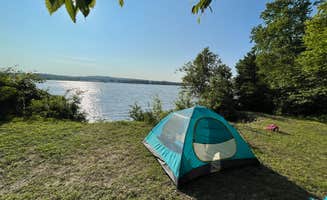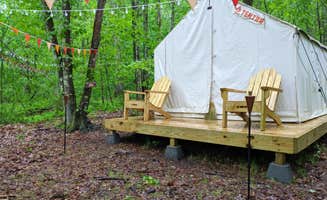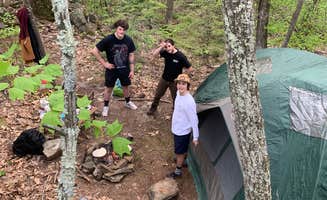Tent campers seeking wilderness experiences in eastern Connecticut can access several primitive river-adjacent campgrounds near Uncasville. The Connecticut River forms the defining geographical feature of this region, with camping opportunities concentrated along the riverbanks and on islands accessed primarily by watercraft. Most sites are located within designated state parks that maintain minimal infrastructure to preserve natural settings while providing basic facilities.
What to do
Kayaking excursions: Chapman Pond Preserve offers paddlers easy access to protected waters with established tent platforms overlooking the Connecticut River. According to Ben L., "Good tent platforms, picnic tables and outhouse. CT river within view. Good site." Kayakers can explore the sheltered pond or venture onto the main river channel.
Castle exploration: Gillette Castle State Park Campground combines camping with historical attractions. Todd J. notes, "Great place for a hike or a picnic. Castle has tours at certain times." The park preserves the former estate of actor William Gillette, featuring a medieval-style stone mansion accessible via trails from camping areas.
Swimming and fishing: The Connecticut River provides opportunities for water recreation directly from campsites. At Hurd Park sites, campers can fish from shore or swim during summer months when water conditions permit. The south end areas offer particularly good access points with gradually sloping shorelines suitable for water entry.
What campers like
Isolation from development: Selden Neck State Park Campground provides a rare island camping experience. Jason S. describes it as "an island in the Connecticut River with no roads or development other than 4 campsites. You have to kayak or boat in." This separation from mainland creates a more immersive natural experience despite proximity to towns.
River views: Campers consistently mention scenic vistas as a highlight of riverside camping. Jackie G. from Hurd Park notes, "It is amazing with the views of the CT River and being able to watch the sunrise and sunset." Most river-adjacent sites are positioned to maximize visibility of water features.
Group camping potential: Several riverside locations accommodate small groups with adjacent sites. As Jackie explains about Hurd Park, "There's a few sites close to each other, so it is nice to go with enough people to occupy them all at once to keep it personal." This arrangement works well for families or small groups seeking shared experiences with privacy from other campers.
What you should know
Boat access requirements: Many premier camping locations require water transportation. For Selden Neck State Park, Jason S. advises, "There's a boat launch across from the island on the west side of the river at Deep River Landing where you can leave your car. It's about a 20 minute paddle across the river to the island." Seasonal parking permits may be required at boat launches from Memorial Day through Labor Day.
Limited facilities: Most riverside camping provides only basic amenities. River Highlands State Park River Campground typifies this approach. Alicia B. warns, "As a heads-up, the outhouse did have quite a few wolf spiders (which might be expected in a natural setting like this)." Campers should prepare for rustic conditions including basic outhouses or no restroom facilities.
Weather considerations: River conditions can change quickly with weather patterns. Morning fog often occurs on the Connecticut River, potentially delaying departure times. One camper at Selden Neck noted, "In the morning, we were completely socked in with fog which would have been an issue if we had to get back early. But it burned off before long."
Tips for camping with families
Protected swimming areas: When camping with children, seek locations with gradual water entry. One visitor to Hurd Park recommends, "You can swim and fish and relax all day!" Sites on the south end of Hurd Park feature slower currents appropriate for supervised swimming.
Pack waterproof bags: Hidden Lake Farm offers more protected family camping with "drinking water, showers, and toilets" according to site information. For riverside camping, remember Jason's advice about Selden Neck: "If it's a nice day, you're going to encounter some wake from passing boats so make sure your gear is in waterproof bags."
Beach access timing: Tidal fluctuations create temporary beaches at some riverfront locations. Jason notes about Selden Neck, "At low tide, a couple of beaches emerge to play on." Parents should check tide charts when planning activities, as these natural play areas appear and disappear throughout the day.
Tips from RVers
Limited hookup options: The best tent camping near Uncasville generally does not accommodate RVs. Most riverside sites permit tent camping only, with no vehicle access or hookups available. RV campers should seek alternative locations outside immediate riverside areas.
Park distance planning: RV travelers visiting tent campers should coordinate meeting locations. Parking areas at boat launches like Deep River Landing provide temporary stopping points approximately 20 minutes paddling distance from island campsites. Coordinating arrival times and equipment transfers requires advance planning.




